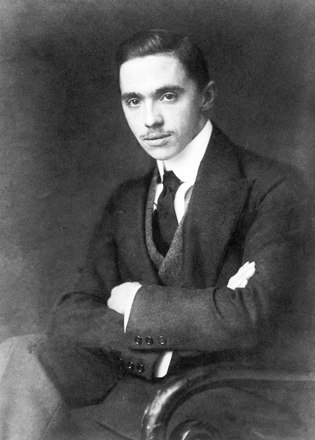Emperor Karl recognized that Austria-Hungary’s continuation of the war in alliance with Germany would mean the end of the Habsburg Monarchy. At the beginning of 1917, in a very round-about way, he initiated investigations into the possibility of concluding a peace with the Entente Powers.
The role of mediator in these investigations was taken by Karl’s brother-in-law, Empress Zita’s brother Sixtus von Bourbon-Parma, with the strictest secrecy being observed in the initial discussions. Between January and March 1917 he cautiously sounded out the conditions of the Entente Powers (most especially France) for a swift conclusion of peace. The correspondence took place in the form of letters composed in French and delivered by Sixtus – hence the name ‘Sixtus Letters’ for the clandestine communications. The whole enterprise was undertaken solely by Karl and his brother-in-law. In spite of the noble aim of bringing peace, one cannot but be surprised at the naivety and amateurishness of their approach to such a complex situation.
It soon became clear what the decisive sticking point would be, namely, the Western Powers’ demand for the cession of Alsace-Lorraine to France and the re-establishment of Belgium as an independent neutral state, which would have hit at the very heart of Germany’s war aims. Although Karl in fact had no influence in these matters, he offered his full support for the Allies’ demands. Foreign Minister Czernin, who was only peripherally involved, considered that the undertaking had little chance of success and emphasized the importance of remaining loyal to the alliance with Germany. In doing so he was expressing views that were directly opposed to Karl’s – a disagreement that was later to have fatal consequences.
After a first attempt to sound out the German alliance partner had proved unsuccessful, a personal visit by Karl to Kaiser Wilhelm proved equally ineffective. Although Karl was frank about the catastrophic state of the Danube Monarchy and absolute necessity of a swift peace, Berlin, encouraged by current successes on the battlefield, held firmly to its demand for a victorious peace and refused to give up Alsace-Lorraine and Belgium.
Moreover, the negotiations being conducted at the same time with the Entente Powers also finally failed on account of Karl’s unwillingness to cede Austrian territory in the Trentino to Italy, which was the condition for Italy’s agreement, as became clear in the course of the talks.
A further reason for the failure of the exploratory talks was that Karl was seeking a comprehensive peace that would also include Germany, while the Entente Powers were only offering a separate peace for the Habsburg Monarchy. For Karl, this would have meant changing sides, which, given the widespread commitment to ‘Nibelung loyalty’, would have had massive political repercussions in Austria; in addition it would also have been a risky undertaking in the military field as German and Austrian units that had hitherto operated in harness would suddenly have become enemies.
So it was that Karl’s peace initiative came to nothing. Although it was not the only one of its kind undertaken by the warring parties, it was regarded as particularly important because of the Emperor’s personal involvement. However, it was not so much its failure that did the Habsburg Monarchy lasting harm but, rather, its bitter postlude: the ‘Sixtus Affair’ was to have fatal consequences for Karl’s position.
Translation: Peter John Nicholson
Griesser-Pečar, Tamara: Die Mission Sixtus, Wien 1988
Kann, Robert A.: Die Sixtusaffäre und die geheimen Friedensverhandlungen Österreich-Ungarns im Ersten Weltkrieg, Wien 1966
Rauchensteiner, Manfried: Der Erste Weltkrieg und das Ende der Habsburgermonarchie 1914–1918, Wien u. a. 2013
-
Chapters
- The enthusiasm for the war
- ‘Brothers in arms’: Austria-Hungary and Germany as partners and allies
- Front lines – The course of the war 1914–16
- Italy enters the war
- The impact of the war on civilian society
- The accession of Emperor Karl
- The Sixtus Letters – Karl’s quest for a way out
- Karl’s bid for freedom
- The Russian Revolution and its consequences
- 1917 – The turning point





